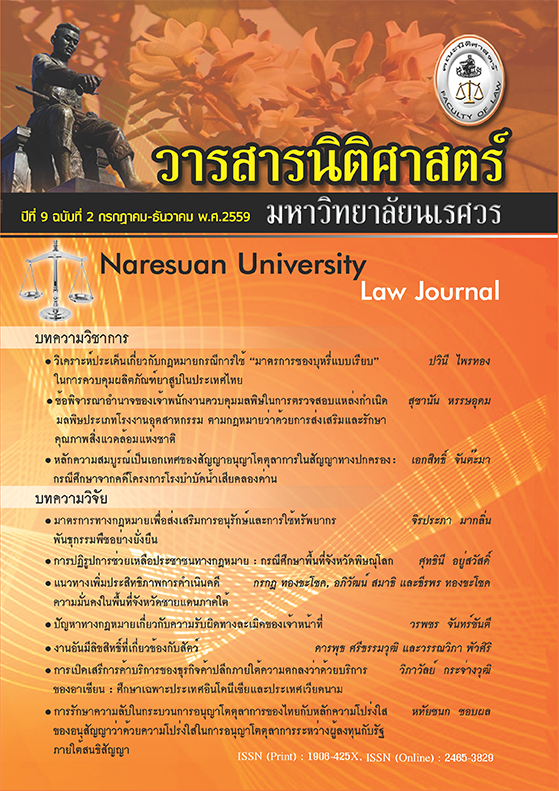The Confidentiality of the Procedures of Thai Arbitration and the Principle of Transparency under the Con
Main Article Content
Abstract
The principle of transparency under the Convention on Transparency in Treaty-based Investor-State Arbitration aims at reiterating the principle of fair and just process. This principle requires the parties to the disputes disclose evidence and information in the arbitral process. This principle was first introduced under the UNCITRAL arbitration Rules in 2013 . Therefore, this independent study will explore and compare this principle under the UNCITRAL rules, the International Centre for the Settlement of Investment Dispute rules (ICSID) and the International Chamber of Commerce rules (ICC). Furthermore, this research will explore the Thai arbitration rules to determine whether they are compatible to the UNCITRAL transparency rules. Generally, disputes arising before arbitration in Thailand are mostly investment disputes, which the confidentiality is the major concern for parties to the disputes. Even thought the confidentiality is regarded as a major concern for arbitration, it is not stated under the Arbitration Act BE, 2545 . Instead, this principle is provide under the Thailand ’s Code of Ethics for arbitrators. This can be imply that if the arbitrators take the principle of transparency into account when examing disputes, Thailand can gain more benefits from this aspect. That means Thailand can ensure, at least, foreign investors that their cases will be examined under the principle of fair and just process. Accordingly Thailand should ratify and become a Member State to this Convention. In doing so, Thailand may have to amend its Arbitration Act in order to perform the obligations under the Convention on Transparency in Treaty-based Investor-State Arbitration Keywords: Transparency,
Article Details
References
"New UNCITRAL arbitration rules on transparency: Application, content and next steps." Last modified 2013. Accessed September 2, 2015.https://www.iisd.org/itn/2013/ 09/18/new-uncitral-arbitration-rules-on-transparency-application-content-and-next-steps-2/.
Tull, T. "The challenge in developing the compatability of Thailand laws. with international rules. UNCITRAL Case. Ministry of Foreign Affairs." Last modified 2014. Accessed August 15, 2015.
https://www.mfa.go.th/ dvifa/contents/file manager/files/nbt/nbt6/ IS/IS6017.pdf. [In Thai]
Cases and Materials on Arbitration 15th Anniversary. Thai Arbitration Institute. Bangkok: Pisit Publishing. 2006.[In Thai]
Cases and Materials on Arbitration 15th Anniversary. Thai Arbitration Institute. 2nd ed. Bangkok: Nititham Publishing House. 1997. [In Thai]
Sorawit, L. "The Award and the Enforcement of the arbitral award." n.d.. Accessed August 15, 2015. https://elib.coj.go.th/Article/arbritation1.pdf. [in Thai]
Thawatchai, S. Arbitation Act B.E. 2545 Bangkok : Nititham Publishing House. 2015. [In Thai]
Argen, R. D. "Ending blind spot justice: Broadening the transparency trend in international."Last modified 2015. Accessed September 2, 2015. https://papers.ssrn.com/sol3/ papers.cfm?abstract_id=2393188.
Levander, S. Resolving “dynamic interpretation”: An empirical analysis of the uncitral rules on transparency. Columbia Journal of Transnational Law, 52 (2), (2014): 506-541.
Uncitral. "Transparency registry a repository for the publication of information and documents in treaty-based investor-State arbitration." n.d. Accessed September 2, 2015. https://www.uncitral.org/transparency-registry/en/introduction.html.


